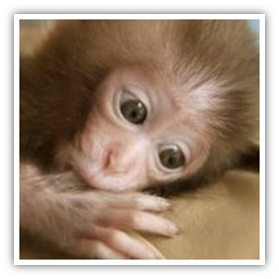Disease from monkeys
Monkeys and other primates can spread many diseases to people and can cause severe injuries. While some states (including Washington) ban monkeys as pets, they may be illegally kept here or legally kept in other states. In addition, every year people are bitten or scratched when traveling to countries where monkeys live alongside people in cities or at tourist destinations.
Risks from monkey bites include serious wound infections, herpes B virus, and rabies. If a person is bitten or scratched by a monkey, the wound should be thoroughly cleaned with soap and water. A health care provider or public health authority should be contracted promptly to assess the exposure and determine if preventative treatments for rabies, herpes B virus or other infections are needed.
- Herpesvirus B (Macacine herpesvirus 1 or Herpesvirus similae or B virus)
Herpes B virus is carried by a high percentage of macaque monkeys. While symptomatic human infection with B virus is rare, the consequences may be severe with a mortality rate of about 70% in untreated cases and the potential for life-long disability in survivors. Most B virus cases have been associated with occupational exposure (a bite, scratch or splash to mucous membrane) to macaque monkeys used in research. However, there is the potential for exposure of travelers to free-living macaques which frequent tourist sites in many parts of the world, or to macaques kept as pets.
Note: Monkeys are not suitable pets. Private possession of monkeys and other primates is illegal in Washington and many other states.
A person bitten, scratched or exposed to body fluids from a monkey should thoroughly wash the bite or scratch or flush exposed membranes, such as the eye. A health care provider or public health authority should be contacted promptly regarding treatment and possible use of antiviral medication to prevent B virus infection.
- Herpes B virus, CDC
- B virus risk from pet macaques, CDC

 Translate
Translate
